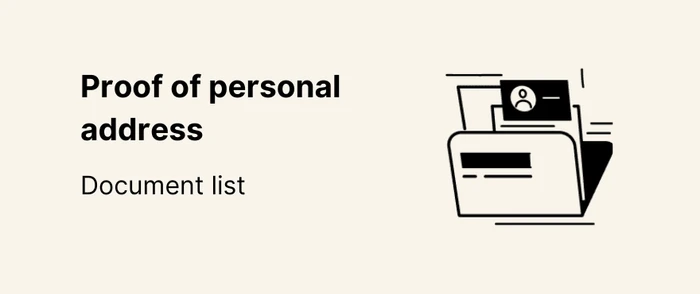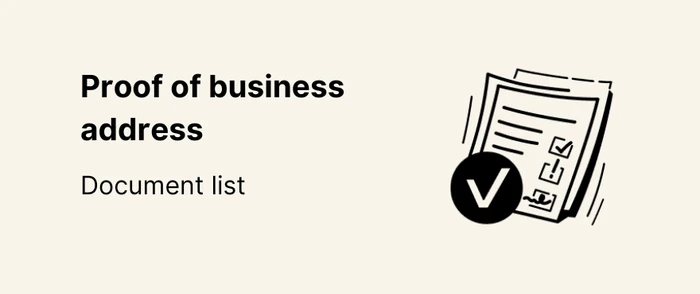Documents that can be used as proof of address
In an era where digital interactions dominate, establishing one's identity and residency has become paramount. This is where the concept of proof of address comes into play. It's a way to verify where you live, and it's used in various contexts, from opening a bank account to applying for a loan.
What is proof of address? Why does the bank need it?
Proof of address is a document that confirms where you live. It is typically required by institutions like banks, government agencies, or other organisations as a way to verify your identity and establish your residence. Here's why they might ask for it:
- Identity Verification: Proof of address serves as an additional layer of identity verification. By confirming where you live, the bank can ensure that you are who you claim to be, reducing the risk of identity theft and fraud.
- Regulatory Compliance: Financial institutions are required by law to follow regulations that are designed to prevent money laundering, terrorism financing, and other illegal activities. Obtaining proof of address helps banks comply with these regulations by ensuring they have accurate information about their customers.
- Contact Information: Traditional banks need your current address to communicate important information, such as bank account statements, notifications, or other correspondence. Having an up-to-date address on record ensures that you receive these communications.
- Risk Assessment: Your address can sometimes play a role in assessing your financial risk. For instance, it might be used to determine whether you live in a high-risk area prone to fraud or other financial crimes.
What documents count as proof of address in the UK?

In the UK, various documents can serve for address verification purposes. Keep in mind that the specific requirements might vary depending on the organisation requesting the proof of address. Here are some common documents that are often accepted as proof of address in the UK:
- Utility Bills: Recent bills for services like electricity, gas, water, or landline phone, with your name and address clearly stated.
- Bank Statements: A recent bank statement sent to your current address by a reputable bank or building society.
- Council Tax Bill: An official bill from the local council indicating the amount of council tax you owe for your property.
- Tenancy Agreement: A signed rental agreement or lease for your current residence, showing the landlord's details and your address.
- Official Letters from Government Departments: Correspondence from government agencies such as HM Revenue & Customs (HMRC) or the Department for Work and Pensions (DWP).
- Mobile Phone or Internet Bill: Bills from your mobile phone provider or internet service provider displaying your address.
- Mortgage Statement: If you own a property and have a mortgage, a recent mortgage statement can serve as proof of address.
- Driving License: The photocard driving license issued by the Driver and Vehicle Licensing Agency (DVLA) can be used as proof of address, but in many cases you will need two separate documents for verification – in this case you will not be able to use it as a proof of your name.
- Benefits or Pension Statements: Statements from the DWP or a pension provider that include your address.
- Insurance Documents: Documents from insurance providers that show your address, such as car insurance or home insurance policies.
- Official Letters from Financial Institutions: Letters from reputable FI, including credit card statements or investment account statements.
- NHS Medical Card or Letters: Documents from the National Health Service (NHS) that include your address.
- Electoral Register Confirmation Letter: A letter confirming your inclusion in the electoral register for your address.
It's important to note that the documents should be recent (usually within the last three to six months) and should clearly display both your name and the address you're trying to verify. Different institutions may have slightly different requirements, so it's advisable to confirm with them directly which documents they accept as proof of address.
What is proof of business address?
Proof of business address is a document or set of documents that verify the physical location of a business. Just like individuals need proof of address to confirm their residence, businesses often need to provide proof of their operational location for various purposes.
Why you may need proof of operating address?
Verifying the physical location of your business holds significance for a range of regulatory, legal, operational, and credibility-related objectives. Here are some scenarios where confirmation of your business's location is typically required:
Business Registration: When you register your business with government authorities, you're often required to provide a valid business address. This information is needed to establish your business's official location for legal and regulatory purposes.
Business Licensing and Permits: Obtaining local business licenses and permits often requires confirming the physical location of your business. Authorities need to know where your business operates to ensure it complies with local zoning and safety regulations.
Compliance with Regulations: Many industries have specific regulations that dictate where certain types of businesses can operate. Providing proof of address helps demonstrate that your business adheres to these regulations.
Tax Reporting: Your business address is used for tax purposes, including determining the appropriate tax jurisdiction and calculating local taxes.
Banking and Financial Transactions: Opening a business bank account or applying for loans will require proof of business address. Financial institutions need to verify where your business operates as part of their due diligence process along with verifying residential addresses of the business owners.
Vendor and Supplier Relationships: Suppliers and vendors frequently need your business location to establish the delivery point for goods or services.
Customer Communication: Your business address is essential for customer correspondence, including invoices, receipts, and other communications.
Legal Actions and Notices: Legal documents, notices, and legal actions related to your business might need to be sent to your business's physical location. Proof of address ensures that these communications reach the right place.
Business Reputation and Credibility: Providing a verifiable business location enhances your credibility and professionalism in the eyes of customers, partners, and investors.
Online and Digital Presence: For online businesses, having a physical address can add legitimacy to your operations and help with local search engine optimization (SEO).
Physical Deliveries: If your business receives physical shipments or mail, carriers need an accurate destination for delivery purposes.
Government Audits: During government audits or inspections, officials may verify that your business's physical location matches the one provided in your records.
Overall, proof of business address serves to establish the legitimacy and transparency of your business operations. It ensures that you're in compliance with various regulations and requirements, helps prevent fraudulent activities, and fosters trust among stakeholders.
What documents count as proof of business address?

Some of the most commonly accepted documents by the banks and payment institutions are:
- Utility bill (dated within the last 3-6 months)
- Office lease agreement
However, there are other types of acceptable documents:
- A statement from another bank
- Government correspondence
- Tax documents (e.g. letter from HMRC in the UK)
- Property deed (if you own the office premises)
- Insurance documents
- Notarised affidavits and other
Are there banks that don't require proof of address?
Yes, there are certain banks and FI that might offer accounts that don't strictly require traditional forms of proof of address.
If you don't have proof of personal address
There are options designed to cater to individuals who have difficulty providing such documentation, such as those who have recently moved or are living in a temporary location. Do research into:
Some Traditional Banks: for example, Lloyds bank UK only asks for proof of address if you don't have one of the following: A UK-issued photo driving licence, passport or a Biometric Residence Permit card.
Digital, Online Banks and Prepaid accounts: Many of them rely on other forms of identity verification such as biometric verification via smartphone, and the proof of address requirement might be more lenient or even absent. This is especially true for prepaid solutions (e.g. Paypal) which provide limited payment services compared to traditional banks, and are subject to lighter regulatory requirements.
Community or Local Credit Unions: Local credit unions or smaller banks might have more flexibility in their account opening procedures compared to larger national banks.
If you don't have proof of business address
Most banks will require you to prove address of your business as corporate bank account applications always go through more rigorous AML and KYC checks. However, you do not have to have an office overseas to get access to local banking methods. For example, at MultiPass UK and EU based businesses can easily pay in GBP, USD, EUR just like local businesses without opening a bank account abroad or registering a new foreign business entity.
Conclusion
It's important to do thorough research of your chosen bank to understand their account opening requirements. Keep in mind that while some banks might have more lenient policies, they will still need to verify your identity and comply with anti-money laundering (AML) and know-your-customer (KYC) regulations. Always ensure that you're dealing with a reputable financial institution to protect your personal and financial information.
If you’re looking to open a business account to easily transact worldwide in 70+ currencies, the process at MultiPass is straightforward – answer a few questions about your business and its payment needs, verify your identity online with a few taps on your phone, and upload company documents – we'll take care of the rest and reach out to you if additional information is required.
FAQ
How to get proof of address without bills?
Obtain official letters from government agencies, employer verification, rental agreements, or bank statements as alternative proof of address.
Is a driver's license proof of address?
A driving license can serve as a form of proof of address in some cases, but it typically needs to be accompanied by another document for full verification.
Is payslip proof of address?
A payslip is generally not considered a standard proof of address. It's a document that provides information about your earnings but doesn't confirm your residential address.
Is the tenancy agreement proof of address?
Yes, a tenancy agreement (rental agreement) can serve as proof of address. It confirms your residence at a specific location and is often accepted by institutions.
Streamlined local and international transfers for UK and non-UK residents.